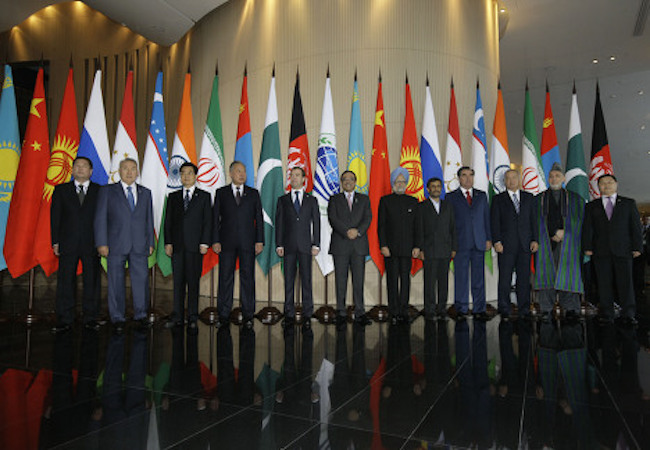Prospective role of Shanghai Cooperation Organisation and other regional organisations in India-Pakistan Crises

By Ammar Younas
Tensions have been escalated since Indian aircraft crossed into Pakistan and carried out a pre-emptive air strike as per Indian claim. After a suicide bomb attack in India, killing 40 Indian troops, India blamed a militant group to be responsible for this attack. Pakistan retaliated, shooting down two fighter jet and detained one pilot, who was later returned to India in what Islamabad described as a peace gesture.
The Indian and Pakistani officials scrambled to get international support on their respective sides, particularly seeking backing from the United States, the United Kingdom, members of the European Union, and Gulf Cooperation Council (GCC).
International community was expecting an active role being played by the regional organizations especially Shanghai Cooperation Organization in de-escalating the ongoing clashes between two of its permanent member states. India and Pakistan joined the Shanghai Cooperation Organization (SCO) as full member states during the June 2017 SCO Summit in Astana, Kazakhstan.
One of the main objectives of SCO is to safeguard regional peace, security, and stability; and to create a democratic, equitable international political and economic order. All member states must abide by the Charter’s clauses. As per the Charter of SCO, Article 2: “The SCO member states shall adhere to the following principles: mutual respect of sovereignty, independence, upholding territorial integrity towards member states. The SCO summits emphasize the importance of results-driven security cooperation among member states, observer states, and dialogue partners. Surprisingly, contrary to these expectations, SCO didn’t comment on the ongoing escalation between India and Pakistan.
SAARC, an eight-member South Asian organization is also an important regional institution where both India and Pakistan are members. Nepal, the current chair of South Asian Association for Regional Cooperation (SAARC) has urged India and Pakistan to exercise restraint. This statement assumes significance in the backdrop of the inconsequential role played by the South Asian regional organization in conflict resolution and peace building in the region. SAARC is largely viewed as a ‘failure’ in promoting regional cooperation, the inability to make progress is, in turn, attributed to the unending hostility between India and Pakistan. India-Pakistan conflict has long defined the boundary of South Asia’s security dynamics. Far from playing a role in interstate conflict, the regional organization has stayed away from crisis in fellow member states. Moreover, the SAARC Charter bars discussion on contentious bilateral issues. But still, SAARC has demonstrated its concern over the ongoing issue.
ASEAN, another important regional organization, ASEAN Foreign Ministers issued a statement on India –Pakistan tensions in which they expressed their serious concern over the recent developments in India and Pakistan which reportedly resulted in the loss of lives and casualties. ASEAN also took note of the efforts by India and Pakistan to reduce tension and resolve their dispute through dialogue and negotiations, in order to maintain peace, security and stability in the region. Moreover, ASEAN condemned the terrorist act on 14 February 2019 in Pulwama and reiterated its strong commitment to work closely with the international community in the fight against terrorism in all its forms and manifestations.
The Organization of Islamic Cooperation (OIC) openly supported the Pakistani side by “condemning in the strongest terms recent wave of Indian terrorism in the occupied valley and by expressing deep concern over the atrocities and human rights violations being committed by occupation forces in the Indian-held Kashmir”. In a resolution adopted by the 46th session of the Council of Foreign Ministers (CFM) held in Abu Dhabi, the OIC member states reiterated that Jammu and Kashmir remains the core dispute between Pakistan and India and its resolution is indispensable for the dream for peace in South Asia. According to a statement issued by the Foreign Office in Islamabad Pakistan, the ministerial meeting reaffirmed its unwavering support for the Kashmiri people in their just cause, “The resolution also reminded the international community of its obligation to ensure implementation of UN Security Council resolutions on the Jammu and Kashmir dispute” .
It is interesting to know that Pakistan has boycotted the plenary session of the 46th CFM at the foreign minister’s level due to presence of Indian External Affairs Minister Sushma Swaraj as a “Guest of Honour”. Due to the armed conflict between the two nuclear armed nations, Foreign Minister of Pakistan Shah Mahmood Qureshi had asked the organizers, including the UAE crown prince, to withdraw the invitation extended to the Indian External Affairs Minister Sushma Swaraj. However, the invitation was not retracted which lead to Qureshi deciding to skip the meeting.
It was the time for the Shanghai Cooperation Organization’s founding member states to act on their often-stated common objectives to reinstate, ensure, and sustain peace, security, and stability in the SCO geographical region. Mr. Vladimir Norov, the new Secretary General paid his first official visit to Kyrgyzstan. Kyrgyzstan is the country that is presiding over the SCO this year and holding the summit of the heads of the SCO member states in June in Bishkek, the capital city of Kyrgyzstan. Mr. Norov told to the Mr. Sooronbai Jeenbekov, the president of Kyrgyzstan that since joining office as Secretary General of SCO, he is trying his best to ensure that SCO summit should be conducted on highest level.
I think that all the SCO founding members countries are really looking forward to this important summit of the head of states. None of these countries would want to discuss an issue which can spoil the mood of any of its member states. Presiding state, Kyrgyzstan will also try its best, not to bring a bilateral conflict on the agenda table of SCO. We cannot neglect this fact that the interstate disputes are the actual issues which disturb the regional peace and security. SCO is expected to play an active role especially if it wants to become an influential regional organization but at this point SCO can issue a cautionary statement at minimum. SCO has potential to be an active organization in solving regional security issues and eradicating terrorism and hopefully, this upcoming SCO summit in Bishkek will give a diplomatic push on India and Pakistan.




